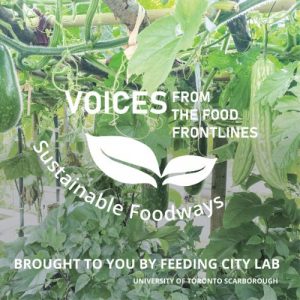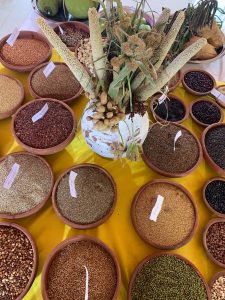Podcast Series | 2023-2024 | Episodes 13 – onwards
The Feeding City Lab introduces its new podcast sub-series, Voices from the Food Frontlines: Sustainable Foodways. Episodes focus on social and ecological resiliency, sharing stories from the field, highlighting grassroots actions, and bringing listeners new research on sustainable foodways and what’s needed to make them possible. With insights from the Feeding City Lab’s local and global partners, Voices from the Food Frontlines: Sustainable Foodways offers a view into community collaborations and creative and cutting edge innovations from across the world — from the cultivation of heritage foods and ethnocultural crops to the food work and small enterprises that enable farm-to-table connections. Stay tuned for episodes, starting in Spring 2024!
This project is generously funded by a Social Sciences and Humanities Research Council of Canada Partnership Development Grant on Resilient Urban Communities & Local Food Systems after COVID-19 and the University of Toronto’s Sustainable Food and Farming Futures (SF3) Cluster.
Visit our online platform to access all episodes in the Voices from the Food Frontlines podcast.
To learn more about the first series of the podcast (episodes 1-12), click here.
Listen and Subscribe on PodBean and Spotify.
Food Frontline Voices: Sustainable Foodways Podcast Series
Production Team Credits
Feeding City Lab PI:
Dr. Jo Sharma
Co-Lead:
Dr. Jaclyn Rohel
Student RAs and Interns (Winter 2024):
Daphne Berberyan
Emma Wan
Jasleen Sohal
Rayah Flash
Sound Credits
Music:
Changing Seasons by Ketsa, licensed with permission from the Independent Music Licensing Collective (https://imlcollective.uk/).
Wounds by Ketsa, licensed with permission from the Independent Music Licensing Collective (https://imlcollective.uk/).
Sound Effects:
Sound effects for this Sustainable Foodways series are sourced from Zapslat (https://www.zapsplat.com).

— New Episodes Coming Soon —
Episode 13 | Connecting Environmental Conservation and Sustainable Food Production in Kerala

Photo Credit: Dr. Jo Sharma
How can grassroots efforts in environmental conservation go beyond their local context to help bring about lasting global impact? In this episode on climate-smart food and farming futures, Dr. Jayeeta Sharma of the Feeding City Lab spotlights the Lab’s collaboration with Thanal in South India. Listeners will learn how the Thanal Trust got its start in 1986 as a collective dedicated to the conservation of rivers and biodiversity to then become a leader in community-based “demand-led research,” opening up pathways of agroecological production for small farmers throughout Kerala. The episode highlights Thanal’s current efforts to recover climate resilient ways of cultivating traditional rice and heirloom millet, linking biodiversity to economy to support sustainable foodways and rural livelihoods. This episode features an interview with Dr. Jayeeta Sharma (recorded in January 2024) and field quotations from Jayakumar of Thanal (recorded in October 2023).
[Additional sound effects from https://www.zapsplat.com.]
Episode 14 | Resilient Farming through Collective Action: Reviving Heirloom Grains in Tamil Nadu

Photo Credit: Geetha Sukumaran
With climate change and increased rural-urban migration, how can communities become self-reliant to ensure nutritious food security? In this episode, Feeding City Lab graduate intern Geetha Sukumaran brings listeners along on the Lab team’s recent research trip to South India. They met with local cooks, food retailers, farmers, and farmer collectives to learn about the challenges they face, the solutions they are implementing, and the changes that theyadvocate in order to create more resilient foodways. The episode spotlights Sheelu, President of the Tamil Nadu Women’s Collective, a grassroots organization that brings together more than 100 000 women from across the local food system, including farmers and agricultural labourers, fishers, salt pan workers, cooks, and food processors. Sheelu describes how the Women’s Collective has evolved over the past three decades to focus on the effects of climate change and on finding ways to support farmers.* Heirloom crops – such as the traditional millets that reliably grow even when the rains fail – play a key role. Listeners will learn how women farmers are working together through “seed democracy” to revive heirloom foods – by conserving and exchangingseeds, by promoting access to land, grain processing facilities, and farming tools, by supporting the preparation and distribution of value-added products, and by sharing knowledge from field to kitchen. This episode features an interview with Geetha Sukumaran (recorded in January 2024) and field quotations from Sheelu of the Women’s Collective (recorded in October 2023).
[* In March 2024, The Women’s Collective was recognized at the The Hindu World of Women Awards, receiving The Hindu Excellence in Agriculture & Rural Development Award.]
Episode 15 | Supporting Ghana’s Smallholder Farmers through Capacity-Building and Policy Advocacy

Photo Credit: Siera Vercillo
In this episode, Bismark Owusu Nortey, Head of Programs and Advocacy at the Peasant Farmers Association of Ghana (PFAG), discusses the Association’s work and how it first got its start in 2005, following the liberalization of farming systems in Ghana. When state subsidies for agri–inputs were removed and the importation of cheap industrial foods flooded local markets making it difficult for Ghana’s smallholder farmers to survive and thrive, PFAG responded. The Association provides a voice in policy advocacy for peasant farmers, builds their farming capacities, connects them with new opportunities and services, and facilitates market access to improve their livelihoods. The episode concludes with a discussion of agroecology and some of the challenges that farmers encounter when transitioning from industrial farming to sustainable farming. This interview took place in July 2023; it was facilitated by Feeding City collaborator Dr. Siera Vercillo, who has been conducting participatory action research for food sovereignty with communities and partner organizations in Ghana for over a decade.
[Additional sound effects from https://www.zapsplat.com.]
Episode 16 | Advocating for Seed Sovereignty and Agroecology in Ghana

Photo Credit: Siera Vercillo & Edwin Baffour
In this episode, Edwin Baffour shares how the civil society organization Food Sovereignty Ghana (FSG) advocates for environmental, social, and food justice. Edwin describes the politics around food and seed in Ghana, the infrastructural challenges that farmers face in accessing indigenous seeds, growing food, and getting it to the market, and the pathways towards agroecological farming. Food Sovereignty Ghana has advocated against GMOs and resisted the Plant Breeders Bill and the Plant Variety Protection Bill through litigation cases across courts in Ghana, bringing attention to the genetic modification of staple foods, such as the cowpea. Through education and stakeholder engagement with traditional authorities, farmers, market vendors and the general public, Food Sovereignty Ghana aims to build “people power” towards food system change. Highlighting that agroecology can empower farmers, Edwin says, “If a farmer can use the neem trees on his farm to tackle pests, he doesn’t need to buy an agrochemical from a company. If a farmer can use garlic and pepper to tackle pests on his farm, then he keeps more money to use for his children’s education and their health.” This interview took place in July 2023; it was facilitated by Feeding City Collaborator Dr. Siera Vercillo, who has been conducting participatory action research for food sovereignty with communities and partner organizations in Ghana for over a decade.
*Update (June 2024) — Since the time of the interview, cases have moved through the courts. Edwin has shared with Feeding City Lab the following updates on the status of the proceedings: “Last year in 2023 the Supreme Court of Ghana unanimously dismissed a case presented by FSG which sought to challenge the constitutionality of the Plant Variety Protection Act which was passed into law in 2021. FSG will be appealing this decision. In May of 2024 the Human Rights High Court also dismissed a case that FSG commenced in 2017 to halt the commercialization of a genetically modified cowpea. Though this decision will also be appealed, the court ruled that all GMO food and feed must be labelled in Ghana.”
[Additional sound effects from https://www.zapsplat.com.]
Episode 17 | Grassroots Food Systems and Ghana’s Centre for Indigenous Knowledge and Organizational Development

Photo Credit: Willie Laate & Siera Vercillo
Development approaches in Ghana need to incorporate indigenous knowledge and worldviews. This is what the Centre for Indigenous Knowledge and Organizational Development (CIKOD) does in its work with communities across Ghana, in sectors such as agriculture, health, education, and natural resources management. In this episode, Willie Laate, CIKOD’s Deputy Director, explains how the organization develops localized tools, frameworks, and programs for understanding and supporting diverse, local knowledge and governance systems. Willie describes the problem with the erosion of cultural systems in Ghana and its impacts on food, traditional culinary knowledge, and indigenous seeds. He offers some examples of cooperative systems and practices that empower communities with diverse food systems, from communal cooking, to community seed sharing and seed fairs, to the cultural festivalsthat help generate development agendas that are more inclusive and not based on predetermined questions and responses. This interview took place in July 2023; it was facilitated by Feeding City Collaborator Dr. Siera Vercillo, who has been conducting participatory action research for food sovereignty with communities and partner organizations in Ghana for over a decade.